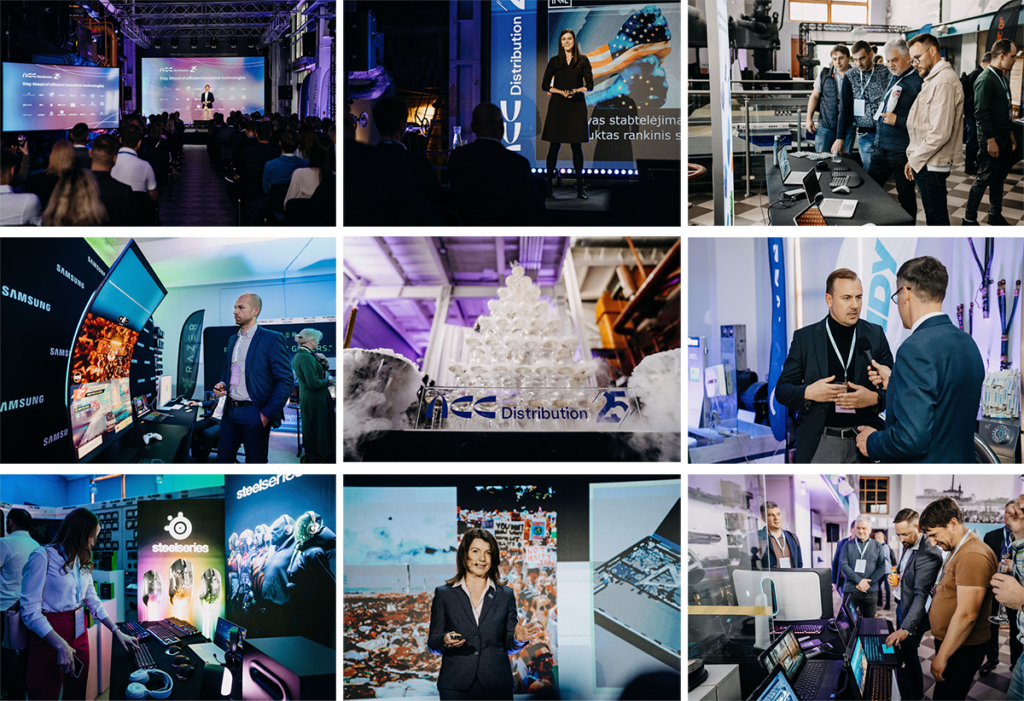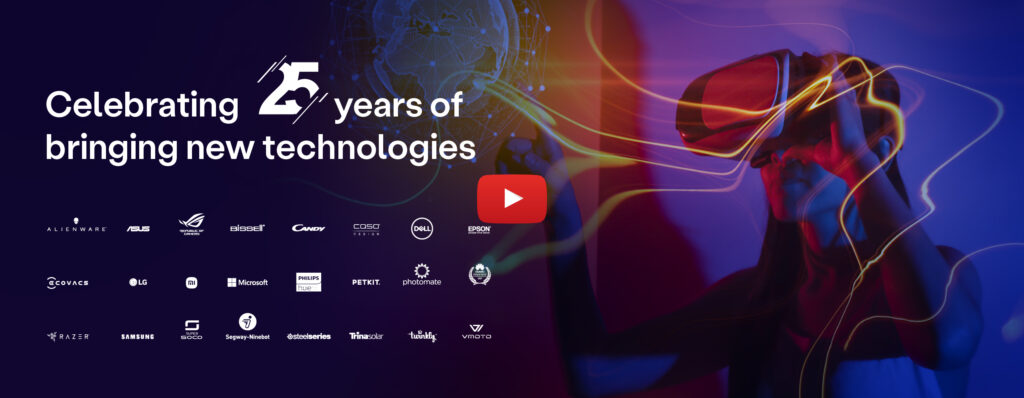- Article
- May 30, 2023
Sustainability in business and technology: which comes first?

ACC Distribution, one of the largest electronics wholesalers in the Baltics, celebrated its 25th anniversary with the international conference #StayAhead, where the topics of technology, innovation, and economic forecasting were brought together by one keyword — sustainability.
Executives from multinational companies and manufacturers such as Dell Technologies, Xiaomi, and ACME Group shared their best practices, insights, and technological innovations for a more sustainable everyday life, noting that the Baltic States, and Lithuania in particular, are in a very favorable position to introduce the concept of sustainability in business on a much broader scale and to be leaders in the field.
In the technology industry, humans are still superior to AI
As Žymantas Baušys, CEO of ACC Distribution, welcomed the conference participants, organizations at the forefront of technology need to not only share their expertise but also demonstrate the importance of the sustainability concept by their example and, together with manufacturers, present the innovations that help each of us live more sustainably.
“In the technology world, there is no chance to survive on artificial intelligence and human intelligence alone — you also need a heart…
…when you understand what you do and why and feel your actions’ impact on others, you can respond to a changing world differently. A human being can react to hundreds of situations, whereas AI can only react to the defined situations. Therefore, humans will be superior to AI in many cases. To employ AI, society must first learn to ask the right questions. I think that correct and well-pointed questions lead us to the right decisions. This is also very relevant to the topic of sustainability,” said Regimantas Buožius, chairman of the board at ACC Distribution, responding to the question of whether technology and AI will be able to replace humans in the future and where and how technological change is moving.
Business sustainability strategies must look at least 10-15 years ahead
During the presentation ‘Sustainability in business — what does it mean?’ Stepas Telešius, the co-founder of ACME Group, discussed how sustainability could be implemented in business.
“Looking at the global picture, Lithuania and the Baltic States are in a very good position to be leaders in sustainability: not only because we have natural resources in excellent condition, which we can easily conserve and even improve, but also because we have a flexible society, which is adaptable and receptive to change, and therefore can easily incorporate sustainability issues into its daily life. I believe we can all do a lot to find more sustainable ways of doing things and living,” said S. Telešius.
His advice to businesses developing a sustainability strategy is to choose clear areas where a consistent change can be made step-by-step instead of trying to cover the broadest possible array of sustainability topics.
“One of the most common mistakes in sustainability strategy is focusing on the short term. Let’s understand that when we talk about sustainability, we discuss a strategy that takes 10-15 years to implement. So when I am asked whether a sustainability strategy can turn from a cost into an investment, my answer is simple: yes, it is a cost today, but it will become an investment in the future. If you are concerned about the cost of sustainability, try asking yourself first: what is the cost of your and your children’s tomorrow?”
Lithuanians are among the most open to ideas of sustainability
Monika Veres, head of Dell Technologies’ Northern and Eastern Europe client solutions business unit, visiting from Hungary, asked what impact a business can have on more sustainable consumption and awareness. With over 120,000 employees, the company promotes sustainability through its employees, internal company culture, customers, and technology-driven changes in people’s lives. According to the representative of Dell, this is a direct responsibility of technology companies to seamlessly bring innovation into the communities of people and businesses, whether in the health, education, or manufacturing sectors.
She also shared Dell’s sustainability practices. For example, the goal of recycling or repurposing a similar old device for every new Dell device sold by 2030. In addition, the goal is to use up to 50% recycled or reused materials when manufacturing new devices. According to M. Veres, e-waste is the fastest-growing waste type on the planet.
“When I read the sustainability indices in the Baltic countries, I see that people in this region are more likely to choose higher priced and sustainably produced products, with 60% of people willing to do so. In other countries, we must do much more to educate consumers and partners about sustainability. This is great news for your sustainability-minded businesses,” says M. Veres, noting Lithuania’s favorable environment for sustainability.
Device charging speed as the priority of sustainability
Andrzej Gladki, deputy general manager for North-Eastern European markets at another tech giant, Xiaomi, talked about sustainability activities through technology innovations that have been or are being developed.
He stressed that sustainability is not only about the production, packaging and logistics but also the use of the latest functionalities of the equipment. Xiaomi presented the latest efficiency solutions in this area.
“For example, by switching the display to dark mode, you can reduce the device’s power consumption by up to 70%. Xiaomi is also focusing on fast battery charging, with around 100 million smart devices and terminals having been equipped with Xiaomi’s hypercharge technology in 2022 alone. This saved around 57 million kWh of energy and 24,852 tonnes of CO2 emissions compared to conventional charging.”
And the technology continues to improve, with the brand’s smartphones charging in just 8 minutes, expected to be on the market this year, with the aim of future smartphones charging in just 4 minutes.
“What difference does it make whether your phone charges in 8 minutes or 4 minutes? Indeed, in the case of a phone, it may not make a significant difference to the consumer. But if we integrate the same principle into electric cars, the difference will be impressive. We believe that the charging time of electronics can become the success factor in the market and sustainability competition,” says A. Gladki, likening EVs to ‘large smartphones’ that share many similarities.
Next year, Xiaomi will launch its first EV , named Modena, which is expected to charge its electric battery in few minutes fully. The product will be officially launched in the first quarter of 2024 — neither the range nor the design has been announced yet.
See the moments of the event :


